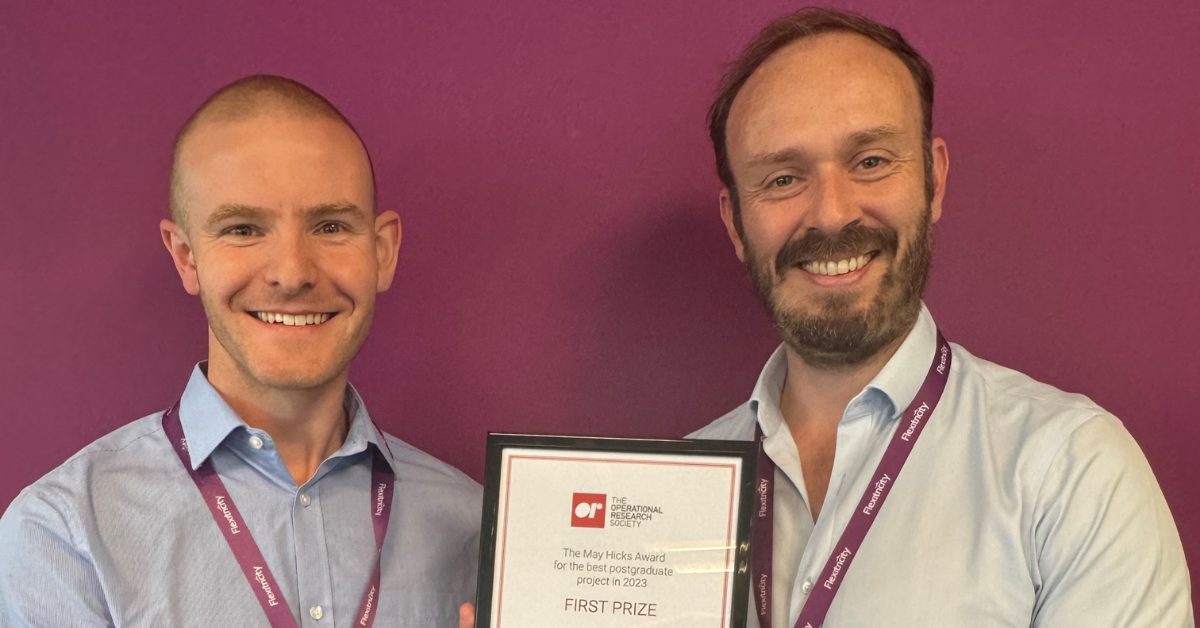From Dunelm to data science

A few years after completing my undergraduate mathematics studies at the University of Warwick, and long after I’d last used the definitions of ‘Lipschitz continuity’ or ‘Hausdorff dimensions’, I was working for Dunelm, the British homeware retailer, in the supply chain analytics team.
The managers of the distribution centre were interested in how to arrange the various cushions, curtains, and colanders in the warehouse so that customer orders could be picked and packed as quickly as possible. I couldn’t help but feel that there was a neater, more satisfying solution and a better set of methods than my arsenal at the time. An internet search led me to the field of Operational Research (OR), its applications to logistics, and far beyond. A fire was lit; before long I’d be relocating to Edinburgh!
And so, a couple of years later, I’m writing this reflection on my MSc in OR with Data Science, and where this journey has led me now.
I studied full-time for a year, taking time out of work to prioritise my learning. My course mates were a diverse group, from a multitude of countries around the world, and with a range of academic backgrounds: maths, science, engineering, business, finance… Before my arrival, I had scrutinised the selection of available courses and remember sampling a selection of extra courses in the first couple of weeks before settling on those I found most engaging.
With the ‘T-shaped’ framework of learning in mind, I aspired to cover a breadth of applied applications, coupled with a depth of optimisation, modelling, programming and statistical skills which form the base of any OR toolkit. To this end, I enjoyed applied lectures about logistics, finance, energy and neuroscience, keeping an open mind about the next steps beyond my MSc.
My favourite module was called Methodology, Modelling and Consulting Skills or, colloquially, MMCS. This course began with a rigorous foundation in linear modelling with Xpress (an optimisation library) in Python. Later, we worked with Sopra Steria, an external consultancy, using OR to generate a proposal for the rollout of electric vehicle chargers across the Scottish city of Dundee.
Working with some locational demand data and a healthy dose of real-world uncertainty, we built optimisation models in teams, before presenting our solution back to a panel at the end of the module. I enjoyed seeing how different teams had approached the problem, and the differing assumptions they had made along the way: there is far more creativity required in applied mathematics than you may first believe.
After several years of work, without exams or assignments, it was at times a challenge to study. I found it helpful to treat the degree as I would any full-time job: working a semi-strict 8am to 5pm, Monday to Friday, to give me time to pursue other interests. Moving to Scotland from the East Midlands, the level up in scenery was not to miss! I joined the University Hillwalking Club on a number of weekend trips, notably to the Scottish Highlands to tackle Ben Hope, the most northerly Munro. A long-time runner, I also joined the Hare and Hounds XC club, training and racing throughout the winter, and continued a passion for juggling at the circus and magic society.
After 2 semesters of lectures and exams, it was time to work on our dissertation projects during the summer. Having particularly enjoyed learning about energy network modelling earlier in the year, I applied to research my dissertation in industry at Flexitricity.
Flexitricity is an asset-backed energy company, who manage and optimise a portfolio of grid-scale batteries (amongst many other flexible assets) through their control room in Edinburgh. Energy storage is an important part of the electricity grid. As more renewables are connected, the variable delivery of power they offer needs to be balanced in real-time. Batteries are a responsive way to do this, and so are incentivised to provide a suite of services to National Grid in a number of auctions. Alongside this, batteries can charge and discharge, trading power in various energy markets.
My dissertation, written for the market conditions at the time, applied many tools and techniques I had studied in the MSc. My dissertation had 3 main components:
- A simulation methodology for generating probabilistic auction outcomes
- A mixed-integer linear optimisation model to determine the optimal strategy for battery utilisation across the day
- A pricing methodology to identify the bid prices that maximise expected revenue for a battery in the frequency response auctions.
Whilst completing the project, it was gratifying to reflect on how I had closed the circle started when working at Dunelm in years past – only now with far greater confidence and technical nous to attack the problem in hand. I was delighted to win the May Hicks Award for my work, which is awarded annually by the OR Society for students working on industry projects in the UK.
I’m writing this post from the Flexitricity office. After my dissertation, I accepted a full-time position as a Data Scientist at the company. With the Pentland Hills ahead, and Edinburgh Castle over my right shoulder. I’m grateful to be living and working in a beautiful city, with historic charm and local vistas in equal measure. I’m learning more every day about the energy industry, and about the optimisation of flexible assets. I see my MSc experiences as pivotal to how I got here.
I’d be happy to answer any questions about my MSc experiences, or chat with any OR fans reading this – you can find me on LinkedIn.
Scott Jenkins
MSc OR with Data Science, 2022/23



